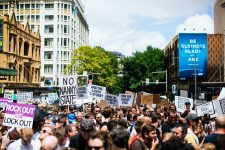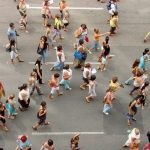Relaxing the Lockouts for Mardi Gras Exposes the Flaws in the Law

The NSW government has agreed to relax the lockouts for Mardi Gras for the second year running. Patrons will now be locked out of Oxford Street, Kings Cross and Sydney CBD venues at 3 am, rather than the now usual 1.30 am.
Keep Sydney Open and Liberal City of Sydney councillor Christine Forster were behind the push to relax the laws on the night of last year’s Gay and Lesbian Mardi Gras parade, which was the 40th anniversary of the event, and the first since marriage equality laws were passed in December 2017.
Last month, marked the fifth anniversary of the lockout laws coming into play in the city’s centre and surrounding areas. With the aim of preventing street violence in the Cross, punters have since been locked out of venues at 1.30 am and last drinks are called at 3.
Further calls this year from councillor Forster and independent member for Sydney Alex Greenwich to have the lockouts suspended for the whole week preceding the event with the global pull have fallen on deaf ears.
And while the decision to delay the lockouts on one of the most popular nights of the year is much appreciated, it does make one wonder if the government relaxes these so-called safety measures on one of the busiest nights in the city, why do they have to be in place at all.
Conflicting positions
“Last year, there were concerns around the night being very busy and potentially there being issues due to the volume of people,” explained Keep Sydney Open campaign director Tyson Koh. “However, there were no issues to speak of.”
Koh asserts that last year’s example is proof that “when people come together and there’s music and entertainment” things can go smoothly. And the irony around a government relaxing restrictions that are supposedly necessary on a night when the city is at capacity is not lost upon him.
The vocal nightlife activist pointed to a 2015 NSW government press release announcing that restrictions would be rolled back for New Year’s Eve, which is another crowded night in the city with more than a million revellers for which the laws have consistently been suspended to accommodate.
The press release states that relaxing the laws “will help reduce street congestion, pressures on public transport, and potential public safety risks”, and it will also “help reduce the volume of people… on the streets immediately after 1.30 am”.
“That sounds like a Keep Sydney Open press release,” Koh said incredulously. “And instead it’s the state government backing up exactly what is backed up by evidence from overseas precincts and management plans. And it’s what we’ve been saying since day one.”
Deserted streets a danger
The lockout laws were enacted by the O’Farrell government following the one punch deaths of two 18-year-old men in Kings Cross. The tragedies happened on the side of the road prior to 11 pm, so it was never clear how locking people out of venues at 1.30 am could prevent these types of incidents.
The impact of these laws on Sydney’s nightlife has been devastating. Over 170 venues have closed down, along with related businesses. And as the once globally renowned city’s cultural life came to an end, the property developers moved in to build apartment blocks on top of its remains.
“It’s the atmosphere on the streets. It’s just not there,” Koh stressed. “It used to be a buzz. And now it’s eerie. It feels cold and lifeless. And women, in particular, complain of feeling less safe because there’s less people around.”
“They have completely destroyed Sydney as an international city,” he added.
Keep Sydney Open candidates
Established in 2014, Keep Sydney Open formed in opposition to the lockout laws. And in January last year, the campaign group morphed into a political party that will be running candidates in the NSW Legislative Council in the upcoming March state election.
And just this week, the Keep Sydney Open Party announced the candidates that will be running on its upper house ticket. The first is Mr Koh, who’s the founder of the party and has a background in the music industry.
Second on the ticket is City of Sydney councillor and former deputy mayor Jess Miller and third is Mardi Gras chair Jesse Matheson, who has a background with the Australian Associated Press and the NSW Architects Registration Board.
And the Keep Sydney Open Party candidates also include Dan McNamee of electronic group Art vs Science, as well as local DJ and producer Tori Levett, “whose career is directly affected by the lockout laws and the war on festivals”.
What they’ll do for the city
Koh made clear that his party has earned so much support across Sydney, and indeed, the rest of the state, as they’ve been front and centre in opposing the laws that are stifling this city, so they’re first rule of business will be to get rid of the lockout laws. “It’s a simple as that.”
Although, Keep Sydney Open doesn’t just want to see the laws revoked, they want to replace them with “evidence-based measures that will keep the city vibrant and safe”. And the party members mean to do this by consulting stakeholders, the community and relevant case studies.
The war on festivals
The Berejiklian government announced via SMS late last Friday night that its festival specific licensing scheme will now only apply to fourteen festivals across the state. This was following threats that the whole industry was about to be subjected to a still unclear and overbearing regime.
“That announcement shows just how shady the NSW government really is,” Koh said. “By singling out fourteen festivals, it proves our point all along that the government wanted to censor these festivals.”
The scaling back of the licensing regime came just days after 20,000 plus people gathered in Hyde Park for the Don’t Kill Live Music rally, which was a major backlash to the unthought out laws that even the premier herself, Gladys Berejiklian, doesn’t seem to understand the implications of.
“We are seeing a government here with a flagrant disregard for civil liberties, culture and for young people who enjoy these events,” Mr Koh concluded. “And for people across NSW who rely on festivals to work.”







